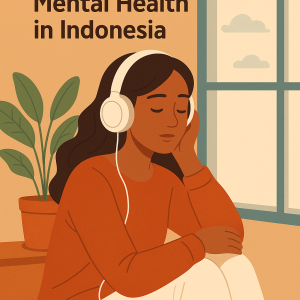Mental Health Awareness in Indonesia: Post-Pandemic Insights
Mental Health in Indonesia: Trends After COVID-19。
Explore how mental health awareness is rising in Indonesia after COVID-19, and what solutions are emerging to address anxiety, depression, and isolation.
 Introduction
Introduction
The COVID-19 pandemic has impacted not just physical health but also the emotional and mental well-being of millions across Southeast Asia. In Indonesia, the crisis has exposed long-standing gaps in mental healthcare, as anxiety, depression, and loneliness surged during lockdowns. This article explores how mental health awareness is evolving in Indonesia and what digital and social solutions are emerging to address this urgent issue.
1. The Rise of Mental Health Challenges Post-COVID
During the height of the pandemic, the Indonesian Ministry of Health reported a significant increase in mental health complaints. Individuals experienced insomnia, fear of infection, financial worries, grief from the loss of loved ones, and prolonged social isolation. For many, these issues didn’t disappear when lockdowns ended—they became chronic.
2. Social Stigma Still a Major Barrier
Despite rising demand for support, social stigma continues to prevent many Indonesians from seeking help. Mental illness is often misunderstood as a personal weakness or spiritual failure, especially in rural communities. These beliefs hinder early diagnosis and treatment, causing delays in intervention that can worsen symptoms.
3. Growth of Digital Mental Health Services
With in-person visits limited, online therapy platforms such as Riliv, Halodoc, and Sehat Jiwa grew rapidly. These apps provide virtual counseling services, stress assessments, and guided self-help modules. Digital platforms are especially beneficial for younger users and those in remote areas with limited access to clinics.
4. Government and NGO Efforts
To address the crisis, the Indonesian government launched national mental health awareness programs, including the “Sehat Jiwa” initiative, aimed at increasing public understanding. NGOs like Into the Light Indonesia and KPSI (Mental Health Care Association of Indonesia) play key roles in suicide prevention, education, and community support programs.
5. Emerging Technologies: AI and Wearables
AI-powered chatbots that offer mood assessments and emotional tracking are starting to gain traction. Some wearable devices now monitor heart rate variability and stress indicators, providing users with real-time feedback. These technologies could revolutionize mental healthcare in areas with few psychologists or psychiatrists.
6. Key Recommendations for the Future
-
Promote destigmatization through national campaigns and school-based education
-
Expand digital therapy services to rural populations and low-income families
-
Train general practitioners to screen for early symptoms of anxiety and depression
-
Support AI-based tools for real-time emotional monitoring and intervention
Conclusion
Mental health is finally gaining the attention it deserves in Indonesia. As digital solutions improve access and public education reduces stigma, more individuals are seeking help and breaking the silence around mental illness. Continued investment in mental healthcare—both technological and human—will be essential for Indonesia’s post-pandemic recovery.
👉 To explore more insights and medical innovations across Southeast Asia, visit us at www.xinrea.com
